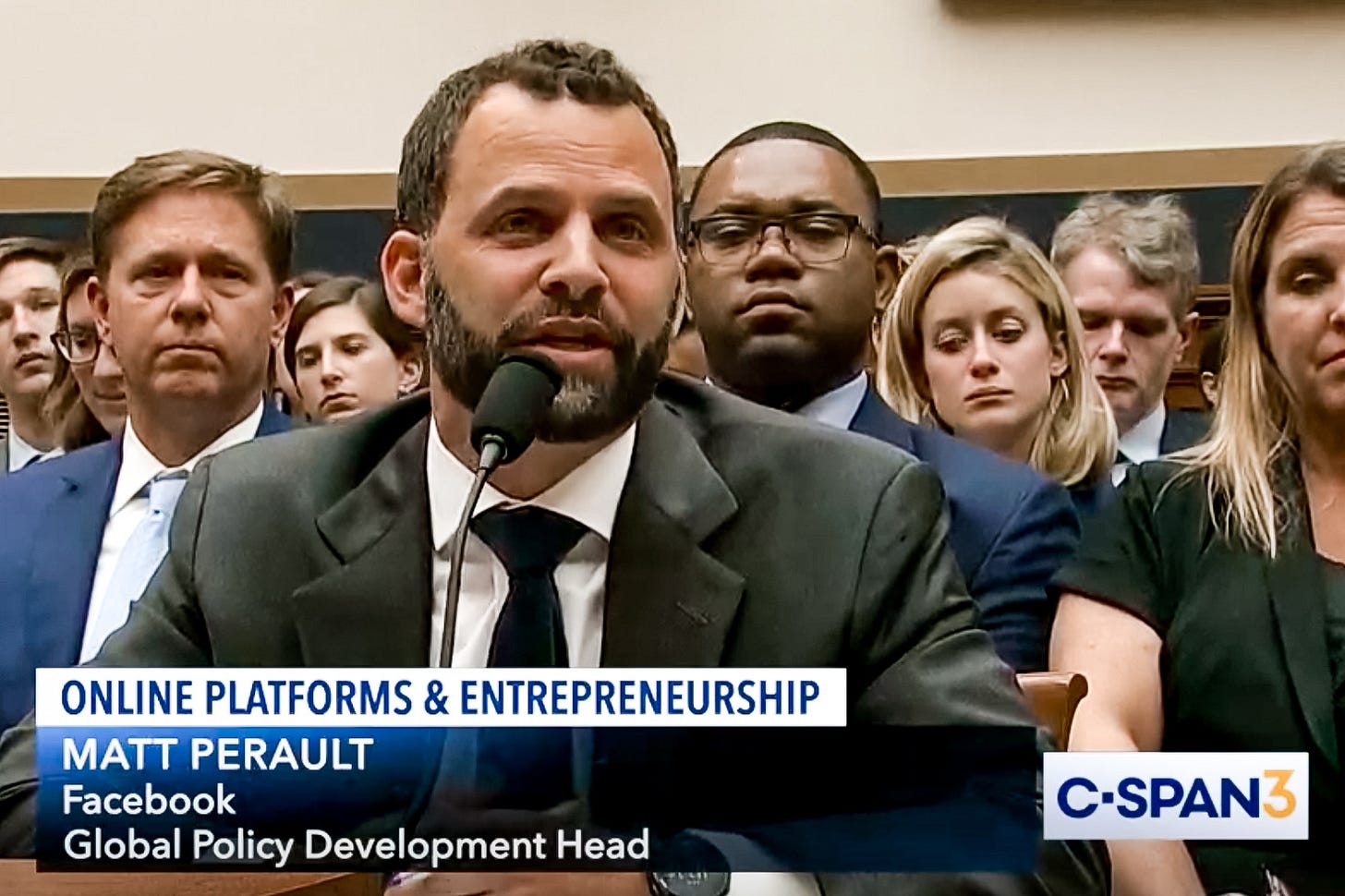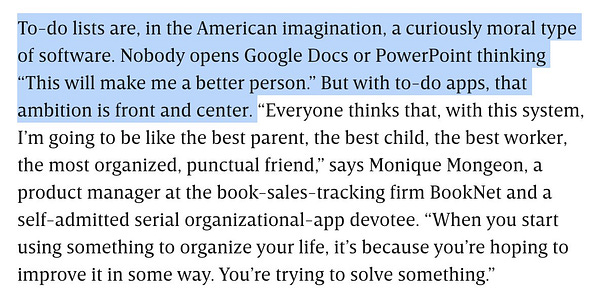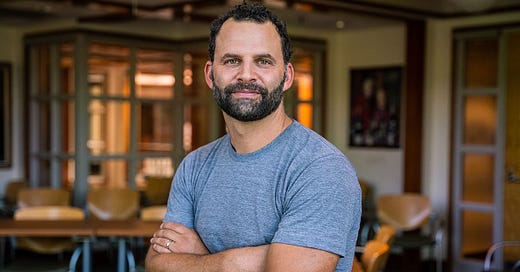Leaving Facebook, with Matt Perault
"It would have felt inauthentic to me to wake up the morning after…and be like, 'Those f____kers, what a terrible company.'"
Matt Perault (@MattPerault) spent nearly nine years at Facebook, leaving the company as head of global policy development in 2019.
While a student at Harvard Law School, Perault served as a research assistant to Larry Summers. But when Summers went off to the Obama White House to be the director of the National Economic Council in 2009 amid the U.S.’s economic crisis, Perault was watching from afar — but not too far — in a clerkship with the D.C. District Court. Perault would instead soon go into government working with another high-profile Harvard professor: Elizabeth Warren.
Warren had been named to chair the Congressional Oversight Panel, a.k.a. COP, charged with overseeing the implementation of the government’s Troubled Asset Relief Program. It wasn’t a particularly glamorous affair. “It's like the opening of ‘The Wire’ where they’re forming the special unit and they all go down to the basement,” says Perault. The COP team’s windowless offices in the Government Printing Office, says Perault, “had forklifts driving outside.”
COP was time-limited by statute, and looking for what was next, Perault joined Facebook in 2011. He recalls those around him questioning it: “Lots of people were saying stuff like, ‘You’re going to go to the company responsible for pokes?’” Working out of Facebook’s D.C. offices, at various times Perault’s portfolio included everything from human rights to virtual reality to antitrust, everywhere from the U.S. to Latin America to India.
Leaving Facebook, Perault headed to Duke University. There he became the inaugural director of the school’s Center on Science & Technology Policy, meant to be a convening point for research and conversation on “the difficult science and technology issues facing our society.”
I was on Perault’s podcast earlier this summer to talk about covering technology as a journalist, and I came away intrigued. High-profile people who leave companies like Facebook tend to pick one of two options: stay in the tech industry or turn on their old employers. Perault’s taken a different path — arguing from academia against requiring online platforms to negotiate with news publishers, for example — and it’s one that’s earned him some amount of heat, which we discussed. (This interview has been edited for length and clarity.)
Scola: What was the appeal of joining Facebook?
Perault: I was sort of dismissive of it at the time, and lots of other people were, too. I remember one guy, when I told him I was going to take a job at Facebook, said something like, ‘I read an article yesterday saying that app’s never going to last. You’re going to end up without a job in six months.’
The policy team was about a dozen or two dozen people. It was a different phase, a different feel. The people I met there had been around fairly early on. I started working with people who had been in the Palo Alto office, people who knew the pool that had been in the movie, “The Social Network.”
“[T]hey built this massive company, this massive tool. The people who do that…is a different sort of person.”
The Palo Alto office?
There were people who had been among the first, like, 35 employees in an office in downtown Palo Alto.
I don’t mean that to say, ‘Oh, isn’t that so cool,’ as much as, ‘They built this thing that became a success.’ Whatever you think of the company’s failings, they built this massive company, this massive tool. The people who do that — to have that much instability in your life and have the vision and purpose and ability to execute quickly — is a different sort of person.
It’s a different sort of person than someone like me, who has a law degree from a good school, who has multiple graduate degrees, but hadn’t done anything in my life. I hadn’t built a thing. I learned an enormous amount.
And the people who came in had more my kind of skill set. They did well on standardized tests. It’s people who knew how to set up a good team in a bureaucracy.
The builders were different. And that was something that, over time, I really missed — that that community was not there as much.

I think it’s fair to say there’s a pattern of people, including some from those early days, leaving the company and deciding they’re going to talk about everything they think’s wrong with it. Chris Hughes is one kind of example, but there are others.
When you leave a company like Facebook, and it’s not just Facebook — if you left Google, and probably TikTok, Amazon, Apple, whatever — you have a decision to make. You figure out, ‘Do I want to write the piece about how unethical my prior life was, how I did all these terrible things, and now I realize the error of my ways?’
To be really clear, that’s a life that has a lot of benefits for your career. There’s maybe a book deal, or you’re profiled in a documentary, or there’s a flattering magazine article. There’s maybe funding from foundations that are critical of Facebook. That’s a route that a lot of people have taken. That’s a very common narrative.
“It would have felt inauthentic to me to wake up the morning after I left Facebook and be like, ‘Those f__kers, what a terrible company.’ Because that wasn’t what I actually thought.”
But not yours?
That wasn’t a route that felt good to me, because my views about the issues didn’t change. I don’t feel like I was a hired gun. I felt like I have a point of view from working closely with the people who were building the product. It would have felt inauthentic to me to wake up the morning after I left Facebook and be like, ‘Those f__kers, what a terrible company.’ Because that wasn’t what I actually thought.
That has presented a lot of complications. Am I still Facebook’s dude? Am I just articulating the company line? I should be really clear, my center doesn’t take Facebook funding. But I’m not opposed to it, just like I wouldn’t say no to someone who wanted to fund me who believes that Facebook should be broken up.
How do you talk about where your allegiances are, your rationale for leaving this thing that was good in so many ways? I was well paid and worked on important issues. I had professional opportunities that were awesome. I had close friends, and people where I felt like we were in the trenches together working on hard problems. That was really gratifying.
Okay, so why leave?
Early on, I could reach my arms out in any direction and I wouldn’t touch anyone. We were getting complaints from human rights activists, and we needed someone to manage our human rights policy. I got to do that. There weren’t a million people competing to get that work. It was, ‘Oh my god, we need someone working on human rights. You’re going to do it? Great.’
That’s very different from the company I left, where every little thing was potentially a topic another team might cover, and you’re dealing with a lot of blurriness around decision-making. You think, ‘We should do this thing that would be helpful to us.’ And then you have to fight many layers of bureaucracy trying to get it done. It just felt less fun.
I’d always been interested in academia and curious whether I could be creative in a different way in an academic context. That has been the case in a whole number of different respects. [But] also I miss the thrill of working for a company like Facebook, where you’re putting out a product that multiple billions of people are accessing. The stakes are high, the people are really smart, the pace is intense. I love that. I miss it.
Last week you and a Duke co-author put out a paper that looked at the sort of political ad bans that Facebook and Google experimented with during the last days of the 2020 general election and at least some of the Georgia Senate run-offs.
Yeah, our finding was that they probably hurt smaller campaigns — less well-resourced campaigns relative to wealthy ones. And that because of how Democrats use Facebook relative to how Republicans, for instance, the bans hurt Democrats more than Republicans.
If you’re already hearing complaints about following the Facebook line, forgive the phrase, but why put a target on your back?
The political ad report is a little bit of a weird thing for me because it wasn’t an issue I was involved in at Facebook. No one would have asked my opinion on it. I was working on competition policy [during his final stretch at the company].
But I’d still like to weigh in on debates about, you know, should Facebook be broken up? Maybe that puts a target on my back, but I think it’s important to have a substantive conversation about it.
I should be really clear, the data in that report is super far from conclusive. I don’t think it should be the definitive word by any means. It was an effort to focus on questions of efficacy, and the story we tell is pretty critical of Facebook.
“The entry point for me was, ‘Holy sh_t, we’re going toward the 2022 elections, and we did this massive thing in 2020, and we have no idea if we should do it again.’”
Maybe it’s critical of the decision Facebook ended up making, but one story you can tell is that Facebook didn’t want to make it and was forced to by media and government. So it’s saying their original instincts were right.
The thing for me is, that’s not how I approached the conversation. The entry point for me was, ‘Holy sh_t, we’re going toward the 2022 elections, and we did this massive thing in 2020, and we have no idea if we should do it again. We should try to figure out if those things work.’ I’m more focused on being the first word than the last word.
One of the things you’re running into, I think, is that tech companies have learned how to fund research, how to fund think tanks. So journalists, at least, are wary.
This is probably a good point to disclose I get funding from Google for my center. And I’d be very happy to take money from Facebook.
They’re not going to buy my opinions. They’re not going to buy the ability to shape what we conclude in our research. I don’t take any kind of exclusionary approach to funding. My goal is to be open to anyone who wants to support our work, whether that’s Open Society, Facebook, or Google.
The thing that’s puzzling to me is that a handful of tech companies are not the only people who support research in Washington. The groups that are critical of big tech companies tend to be funded by the same set of organizations. I just don’t quite understand why Person A and their set of biases is necessarily better than Person B and their set of biases.
And it just feels to me to be kind of a silly question to have because the substance of the report is the substance of the report.
“What motivates me is that policy should be a tool for helping to figure out how to get the best of things and cabin the worst.”
You’ve also been willing to say what you think Facebook should do.
I’m invested in debates about tech policy. That’s what I’m excited about. I don’t want to write a book three people will read. I want to be engaged in the issues of the day, and try to unpack them in a new and different way. Maybe I’m sounding Pollyannish, but I’m just curious about a lot of stuff. And I think there’s room for more curiosity-oriented research.
One [topic] I’m really interested in is ShotSpotter. There are communities that say, ‘This technology is going to help police protect us.’ Then there are the people who say, ‘This is going to perpetuate problems of racist law enforcement.’ And my question is, can policy help to solve this? Are there restraints we can put on deployment so that we get all the benefits and mitigate some of the harms?
That’s not a pro-‘Big Tech’/anti-‘Big Tech’ thing. What motivates me is that policy should be a tool for helping to figure out how to get the best of things and cabin the worst. And my excitement about academia is that it gives us the room to explore those things.
So why not forget Facebook and focus on ShotSpotter?
I don't want to toil in the wilderness.
And I think breaking up big tech companies will be really disruptive. I’d be very happy for platforms to do less content moderation. To be hands off on that just because someone’s going to come after me is a mistake.
My view of this — which I think has actually been liberating — is that it was pretty clear to me after leaving Facebook that I was never going to not be a ‘Facebook person.’ The only way to do it was to be Chris Hughes, which I would have done if I had believed it. But I didn’t believe it.
TOOLS FOR GETTING THE BEST OUT OF US


The enthusiasm for productivity tools in these parts is undiminished by this generally excellent piece by Clive Thompson in Wired on why despite all our to-do apps, we still struggle to actually get things done. Perault shares some of his favorites:
“My number one productivity tool is Todoist. It’s been one of the most revolutionary things in my life in the last five years. I used to be someone who, when we would have a weekly meeting on things, right next to the agenda I would write down what I wanted to do. I’d carry it around for a week, and I wouldn’t do half the things on the list and I’d try to carry them over to the next week.
Now I just put everything in this app. Part of it is you can assign different due dates. You can postpone things. So if you don’t accomplish stuff in one day, you can move it to the next day or assign it to the next week. That’s helpful.
The other answer is that one of the most productive things I’ve done is carve out zones to not be productive. I started a Shabbat routine with my now wife, then girlfriend, in Washington. I would block meetings on my calendar starting at 3 p.m. on Friday. There was a meeting with senior people at Facebook from 2:30 to 3:30, and I walked out in the middle.
It set up a focus on trying to be cleansing, on getting some distance from work. I love the Cal Newport stuff about figuring out how to get depth in your work by giving yourself some space.”






